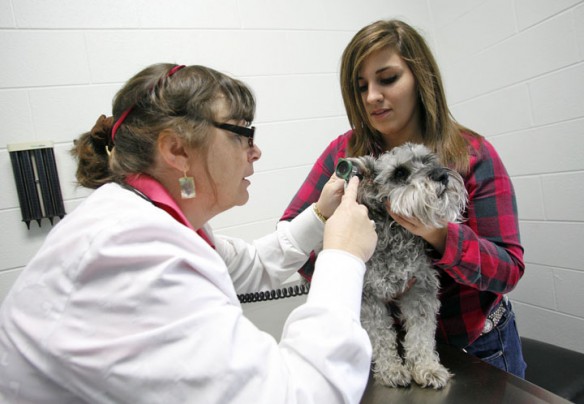
Lafayette High School (Fayette County) senior Camila Modica holds Brody while Dr. Lynne McMaine examines his ears at Locust Trace Veterinary Clinic. The full-service clinic, staffed by experienced veterinarians and technicians, provides Locust Trace AgriScience Farm students an opportunity to observe and assist. Photo by Amy Wallot, Sept. 28, 2011
By Susan Riddell
Camila Modica owns horses, dogs, cats and rabbits. The Lafayette High School (Fayette County) senior loves her animals and hopes to be a veterinarian one day.
She knows, however, that her animal experience and good grades won’t be enough to get her accepted into a college veterinary program.
“You have to have work experience in a clinic,” Modica said. “I won’t get in (a college program) without that and being the well-rounded student they are looking for.”
Luckily, Modica and others like her now will have that chance to work in a clinic thanks to the Locust Trace AgriScience Farm.
The farm, which opened this fall and is part of the Fayette County school district, sits on 82 acres and enrolls 188 students who attend classes there for half a day throughout the school year. Most of the students attending Locust Trace also are enrolled in another Fayette County high school, but others attend Woodford County High School.
“The No. 1 reason kids are turned away (from vet school) is because they haven’t worked in clinics and don’t have those hours,” said Sara Tracy, Locust Trace community liaison. “Our animal science and veterinary programs, with an on-site vet clinic, give students opportunities to have the hands-on experiences that are vital to eventually being accepted to vet school.
“We have a wide variety of students coming from both rural and urban backgrounds,” Tracy added. “Locust Trace gives them the education and opportunities to travel whichever path they choose, whether it be on to further education or straight into their chosen career.”
ILPs assisted in school, programs development
Tracy said the idea for the school came from Locust Trace Principal Joe Norman, who always dreamed of expanding the horticulture program at Eastside Technical Center, where he still serves as principal.
While researching to verify a need to go along with that vision, Norman and others studied student Individual Learning Plans (ILPs) across the district.
“There was a very heavy interest in veterinary and animal sciences,” Tracy said. “That partnered well with Norman’s vision, eventually leading to the addition of Locust Trace as an expansion to programs offered at both Eastside and Southside technical centers.”
“We want the ILP to drive enrollment into our programs,” Norman added. “Next year, for Eastside Technical Center and Southside Technical Center, we’re looking at pulling ILPs and identifying students with specific career interest in the career clusters. After we identify those students, we’ll meet with them to ensure we get them in the right places.”
The ILP is the “consummate resource for guiding students” as they begin thinking and planning for their future, said Sharon Johnston, the ILP program consultant for the Kentucky Department of Education (KDE).
But the Web-enabled college- and career-planning tool also is a great resource that schools and districts can use to examine and possibly refocus what and how they are teaching their students, she said.
“Locust Trace is a great example of how schools and districts can use ILPs to help guide their students’ college and career plans, but also to align their course offerings and instruction with the skills and knowledge those students will need to be successful in their future endeavors.”
School offers hand-on experience
In the non-profit vet clinic staffed by paid veterinarians and technicians, students can observe what takes place, but they must complete a rigorous training program to be able to handle animals and medicines. The clinic’s medicine is secured in a locked cabinet that also requires fingerprint authentication, Tracy said.
Student observation is allowed for surgery and other procedures. To help with this, cameras are set up in the clinic so live audio and video can go back into the classroom.
“That’s a neat teaching tool,” Tracy said. “You can’t put 30 kids in here for a surgery. That’s not safe or practical. So when the kids are in class, they can watch the surgery and ask questions.”
Animal science classes are offered to tie in with the veterinary clinic. Students get hands-on experience raising, feeding and/or breeding birds, rabbits, chicks, mice, guinea pigs and more. Bigger livestock such as horse, cattle, goats and sheep will be on campus once farm construction is complete.
Michael Parlanti, a senior attending Paul Laurence Dunbar High School (Fayette County), owns a Colombian boa constrictor named ZayZay. The snake stays at Locust Trace for student observation, and mice are bred there to feed ZayZay.
While Parlanti is no stranger to snakes and other animals, he came to Locust Trace to learn more about agriculture.
“I love hunting and farming, and I’ve been thinking about being a teacher,” Parlanti said. “I wasn’t sure what exactly I wanted to teach, but after being here for a short time, I already know that I want to teach agriculture.
“It has broadened my view of agriculture in general,” Parlanti added. “There are so many things you can teach and learn about; I know I have more than one option, too. I’m learning how to take care of soil, and that’s something I never really thought about before. I really enjoy it here.”
The agriculture classes offered at Locust Trace range from plant or land science to environmental science and biotechnology.
Greenhouses, orchards and table grape vineyards take up five acres for growth, cultivation and harvesting. Aquaculture classes also are offered.
An added feature of the farm is its environmental design. The farm is minimally connected to water, sewage and electrical municipalities. Instead, it relies on solar panels, constructed wetlands, on-site wells, cisterns, and passive solar and geothermal technology.
“My favorite aspect of Locust Trace is seeing the excitement on the students’ faces as they are learning new things they are truly interested in,” Norman said. “It’s a world of difference when they get to apply what they are learning. We prepare them to enter the workplace immediately out of high school or to be able to go to postsecondary education. We know the more education they receive in a field, the more opportunities they are going to have.”
Norman said expectations are high for students.
“They must be involved in the class; this isn’t a place for them to come just to get out of their high school for half a day,” Norman said. “We expect no discipline issues, and they have to keep their grades up here and at their high school. To stay in our programs, kids have to perform well because there are other students who want to be and aren’t here.”
Tracy said enrollment will exceed 250 students next year. To help with scheduling conflicts and make sure that students can commit to a half day at Locust Trace, traditional mathematics, science and English courses are offered.
“The goal is eventually to make this a full-day high school,” Tracy said. “There also are grand hopes of a culinary program. We’ll have our plant/land science students grow the food and our culinary students prepare food for the lunches. That would be a really neat thing for our students to be able to do.”
MORE INFO …
Sara Tracy, sara.tracy@fayette.kyschools.us, (859) 381-3990 ext. 30224
Sharon Johnston, sharon.johnston@education.ky.gov, (502) 564-2106, ext. 4159










Leave A Comment